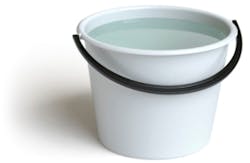NOAA study informs list of 11 cities with risk of water shortage
WASHINGTON — Using a recent report from the National Oceanic and Atmospheric Administration's (NOAA) Cooperative Institute for Research in Environmental Studies, the Huffington Post has compiled a list of 11 U.S. cities that are at risk for running out of water in an article on the website.
The NOAA report showed that nearly one in 10 watersheds in the U.S. is stressed, with water demand exceeding supply, the article reported.
"By midcentury, we expect to see less reliable surface water supplies in several regions of the United States," said Kristen Averyt, associate director for science at CIRES and one of the authors of the study. “This is likely to create growing challenges for agriculture, electrical suppliers and municipalities, as there may be more demand for water and less to go around.”
According to the article, the cities most at risk in order of population, are Salt Lake City; Lincoln, Neb.; Cleveland; Miami; Atlanta; Washington; El Paso, Texas; San Antonio; the San Francisco Bay Area; Houston; and Los Angeles.
Read the full article here.
